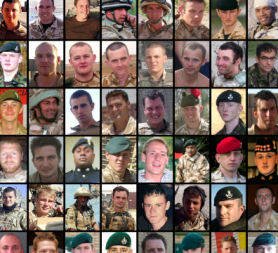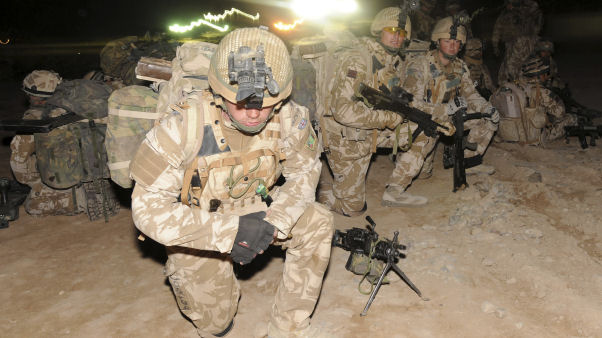Why the UK cannot pull out of Afghanistan
Writing for Channel 4 News as the UK death toll reached 300, former British commander Colonel Richard Kemp said the UK could not afford to leave the country until its objectives are achieved.

The death rate in Afghanistan seems shocking. But casualties are a brutal reality of all wars. And compared to many previous conflicts the figures in this nine year campaign are low.
In the Falklands we lost over 250 troops in under three months. Almost 700 British soldiers were killed during the three years of the Korean War. And on average 178 died every single day in the six years of the second world war.
Even in the Northern Ireland police action, in 1972 alone we had as many killed as in the bloodiest year in Helmand.
But every soldier’s death is a tragedy. The end of each individual’s hopes and dreams for the future, and a whole family’s life shattered forever.
We should not inflict such pain and suffering on so many people without good cause. As we pass this latest horrible milestone, should we therefore be calling for the withdrawal of our forces?
Every soldier’s death is a tragedy. The end of each individual’s hopes and dreams for the future, and a whole family’s life shattered forever.
Nothing less than the security and safety of our people at home and around the world is at stake. The Taliban are fighting with such tenacity, and making so many sacrifices themselves, that there is no question of their utter and total determination to take back the country and re-establish a violent, oppressive fundamentalist regime over the people of Afghanistan.
Anyone who thinks that would be an end to their ambitions fails to understand their agenda. If the Taliban were to succeed, international jihadists from Pakistan, the Middle East and around the globe would flood back into Afghanistan and set up shop, as they have done in the Taliban-controlled areas of north west Pakistan. It was in exactly these circumstances that the 9/11 attacks were planned, prepared and launched.
British forces in Afghanistan: why are we there?
Some argue that the Afghan Taliban and al-Qaida are no longer closely connected, and that our fears of a Taliban state threatening western security are unfounded or overstated.
But in its latest report on violence in Afghanistan, the UN tells us unequivocally that “the shift to more complex suicide attacks [in Afghanistan] demonstrates a growing capability of the local terrorist networks linked to Al Qaida.” Al Qaida’s murderous ambitions are far from local.
No less worrying is the possibility of extremists toppling the government of Pakistan. The insurgency there is growing in violence and effectiveness every day. Should we allow the Taliban to take over Afghanistan, the country would rapidly become a safe haven from which the Pakistan insurgency would be supported and strengthened. This would take us closer to a nuclear armed state under control of Islamist extremists.
And if we leave Afghanistan before our objectives are achieved, the Taliban and al-Qaida will loudly claim to have defeated the most powerful armies in the world. There will then be an explosion of violent jihad around the world.
But can we win in Afghanistan?
Our ability to kill Taliban fighters and commanders in larger numbers than they can kill us is beyond doubt – we have been doing it since we first deployed to Helmand in 2006. But that alone is not going to win this counter-insurgency war. Two other things are necessary.
First, though we may never eradicate the Afghan Taliban, we must reduce to a manageable level their capability to threaten the Kabul government’s authority. To do that we must gain the confidence and support of the population, especially in the Pashtu areas, so that they will deny shelter and aid to the insurgents and provide us with vital intelligence about their membership, plans and intentions.

We must split off those elements of the Taliban that can be either won over to support the government or at least persuaded to cease violent opposition. We perhaps witnessed a few tentative steps forward in this extremely difficult and uncertain process at the Afghan peace jerga earlier this month.
But the single most effective way to undermine the insurgency is for Pakistan to stop supporting the Taliban. Both the army and the inter-services intelligence directorate are involved in direction, resourcing, planning and provision of intelligence.
If this assistance was to be cut off – even without the Pakistan security forces directly working against the Taliban – the insurgents’ capability would be hugely reduced.
As with everything else in this regional conflict, tackling this is far from straightforward, especially given the lack of government control over the Army or ISID. It should, however, be one of the highest priorities for British and American diplomacy and influence.
The single most effective way to undermine the insurgency is for Pakistan to stop supporting the Taliban.
Second, the Afghan government and security forces must develop the capability to take on the management of a reduced Taliban insurgency with minimal assistance from outside. This is a tall order. The Afghan police remain in a dire situation. They are undisciplined, unreliable and corrupt.
The army is progressing in effectiveness and strength, but it is questionable, at the very least, how well they would stand up without direct Nato support and partnership – especially if the insurgency remained strong.
No matter how good the security forces might become, they will be irrelevant without an effective government in Kabul. The Americans turned the South Vietnamese army into a well-trained, well-equipped and effective fighting force.
But when the US military left in 1975, they collapsed immediately, incapable and unwilling to fight for a corrupt and incompetent government without the Americans alongside them.

All of this must be achieved while the military campaign progresses – and continues to buy time.
To succeed, politicians, diplomats and humanitarian workers – including from those Nato states that have so far proven unwilling to join the fight – will need to match in energy and skill the blood sacrifices that have been made by the fighting forces, including the British troops who have been killed so far.
Colonel Richard Kemp is the former commander of British troops in Afghanistan.




